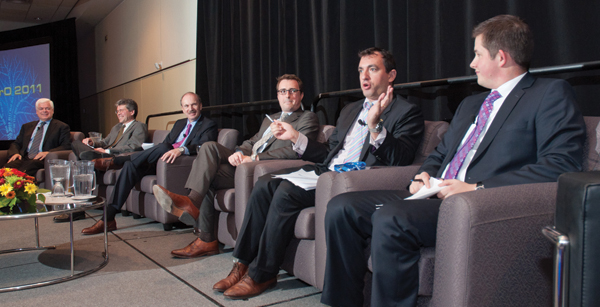
Although it’s clear that renewable energy has moved very close to apple pie in political terms, more subtle factors seem to be affecting the political landscape for electricity at the same time. At the APPrO 2011 conference on November 16, a panel of political experts shared their thinking on how the dynamics of provincial politics on electricity have shifted in the last year, and where the changes are leading. Analysts from across the spectrum seem to agree that voters are more sensitive to electricity issues, and more likely to consider supply mix and sectoral management questions when casting their ballots in the future. For the power industry, which has usually been treated as a minor issue during election campaigns, this kind of change is historic. In addition, the new sensibility seems to be accompanied by a more nuanced approach to electricity prices amongst voters. They are now more likely to consider the cause of price increases, and whether the price increases are justified, rather than reacting negatively en masse to any form of increase.
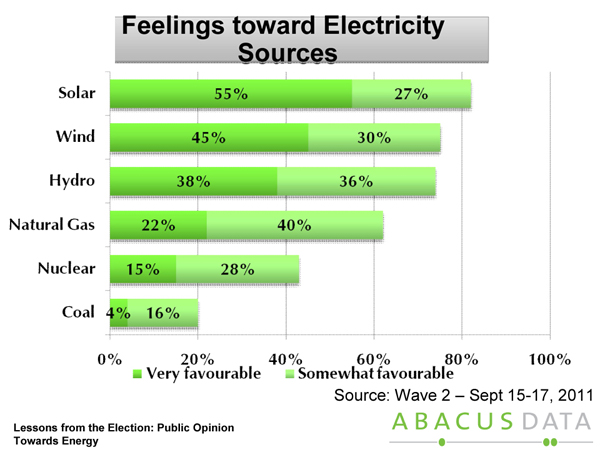
David Coletto of Abacus Data opened the session on November 16 with analysis of some of his recent public opinion research, and a discussion of whether the data showed that energy policy significantly affected the outcome of the election. He posed two key questions: “Did anger over wind turbines cause the Liberals to lose rural seats?” and “Did the energy debate affect the outcome of Election 2011?” On the first question, he said many are still working on this question, but the data is inconclusive. Research shows a generally favourable reaction to renewable energy (see above). Furthermore, a breakdown by rural versus urban voters does not show much differentiation on wind.
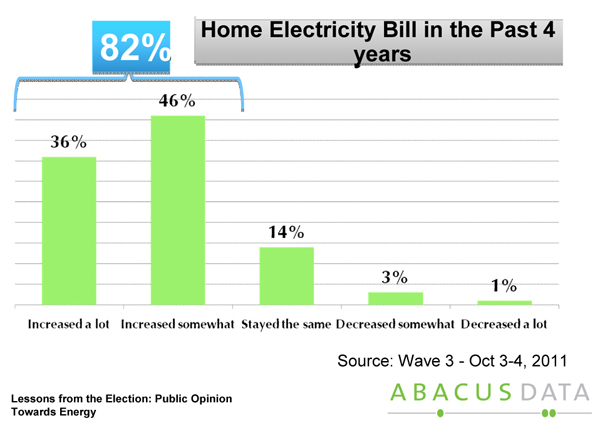
On the second question, of whether the energy debate affected the election, Mr. Coletto’s answer is yes, but only slightly. The state of the economy took on a greater importance for voters, and energy policy was secondary to that. This finding is interesting particularly in light of the fact that his data showed that a majority of Ontarians did notice that their electricity bill has increased in the past five years.
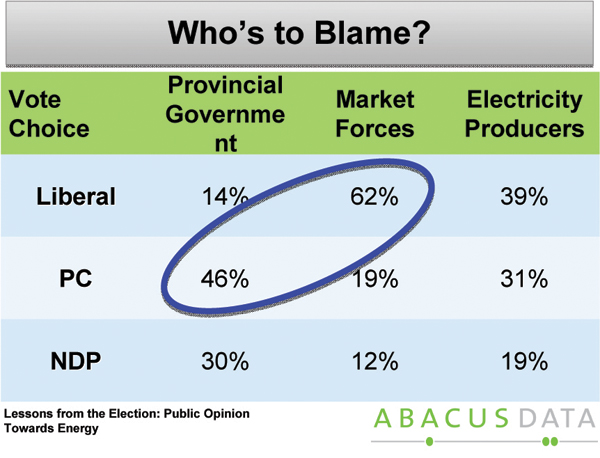
Furthermore, a large portion of those polled believed that rate increases were the fault of the provincial government, rather than the result of market forces or power producers. These beliefs however, break down strongly along party lines.
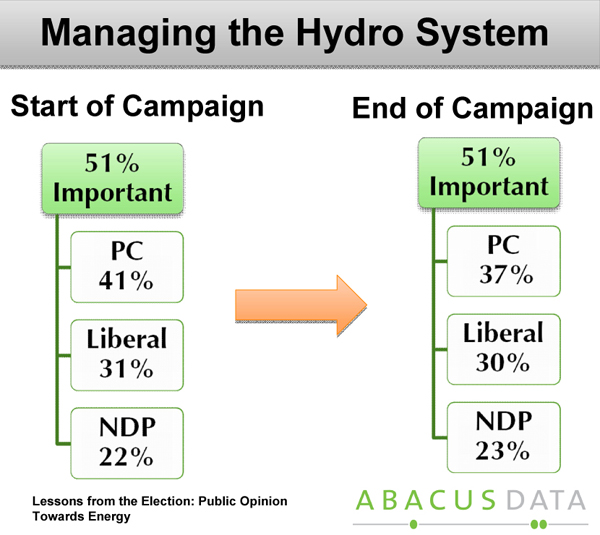
Throughout the campaign, voters considered the management of the electricity system an important factor in their voting decision. This is a significant change from the historical pattern in Ontario.
Mr. Coletto was able to conclude that those who cared strongly about management of the electricity system were more likely to believe the PC Party would be best at managing the system, Moreover, those who said hydro prices had increased a lot in the past four years were far more likely to vote PC than Liberal or NDP. Although electricity prices did have an impact on voting preferences, the Liberals were able to win the election because the overall state of the economy was the more important factor at the end of the day. Coletto observed that public opinion on the sector is fluid, and that perception about power prices continues to be an important driver, albeit subordinated to the general state of the economy.
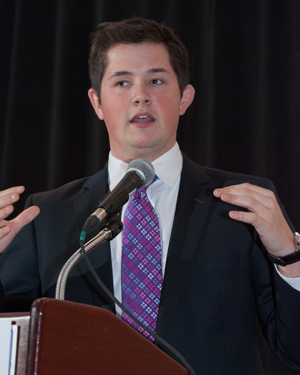
David Butters of APPrO then outlined what he sees as the top five decisions that political leaders will need to make in the near future, and how success will be judged on each question. They are:
1. How to cool down the political temperature of the sector
2. Where the industry can eliminate costs, without unintended consequences
3. Striking the correct balance between ratepayer costs, jobs and the economy
4. The FIT Review
5. How should nuclear refurbishment proceed.
In order to succeed, Mr Butters argued that politicians will need to have the courage of their convictions, and avoid decisions based on expediency. Although government has always been involved in the power system, the inherent complexity of the industry requires a steady hand to drive policy. Government needs to resist the pressures to make one-off decisions based on expediency. The system is complex, and there are many factors that are beyond anyone’s control. For example, the price of natural gas when new discoveries come on line is a major unknown. The political and cost drivers are very real. This means the industry has to show ratepayers that it is extracting maximum value while clearly communicating its benefits as well as its costs. If it can’t do that, ratepayers are likely to rebel.
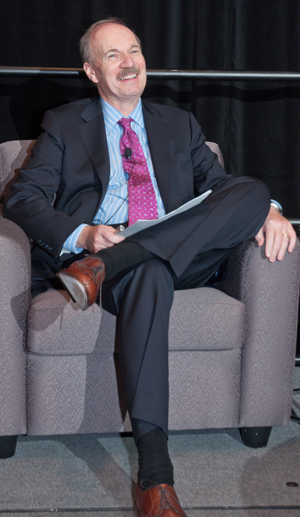
Rob Silver of Crestview Strategy also echoed others’ statements on the importance of steady policy and leadership. Looking at the past 26 years, the energy portfolio has seen 20 ministers. These ministers come from all three major parties, and despite the complexity and importance of the energy file, they have an average tenure of only 17 months. From this, Mr Silver’s principal piece of advice for Ontario’s new Minister of Energy, Christopher Bentley, was to “take a long-term approach.” It’s a large, important and difficult file, he said, and it seems to be one on which ministers like to put their personal stamp. But what the sector needs is longevity of tenure from its minister, who can take the time to truly develop expertise and decide the direction of the sector. Developing a relationship and good communication with the sector is important. The energy sector will benefit from a well-thought-out, long-term plan that is clearly communicated to the industry.
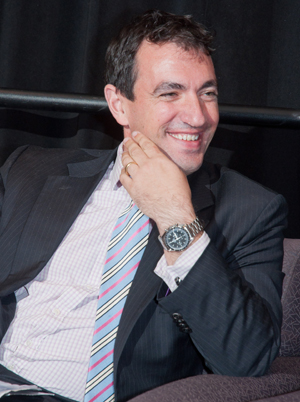
Next, Peter Tabuns, who is both an elected member of parliament and the NDP energy critic, outlined his view of the key factors to consider when making policy decisions affecting the Ontario energy industry. Mr Tabuns stressed the importance of combating climate change, and his belief that conservation and renewable energy are critical for addressing the problem. He also believes energy policy has an important role to play in promoting economic development in the province, but sees a key question in that regard as being the degree to which privatization is allowed to spread across the sector. He views the next decade as one of great opportunity in reversing Ontario’s current economic decline, as a large proportion of generation capacity will need to be replaced. Mr. Tabuns suggested that the Ontario Liberals are engaged in a “quiet privatization” of the power system in the province. This has consequences for the affordability of power, he said. Based on extensive personal contacts in his riding, he said that for 20% of voters, power prices are a determinative issue.
Mr. Tabuns said that the Minister must recognize that Ontario has an opportunity to move beyond traditional sources toward greatly increased reliance on conservation and renewables. He rejected claims from the Conservative side of the legislature that renewables have been driving up the cost of power, and urged the Minister not to fall prey to that argument but to support renewables as a growing and critical sector.
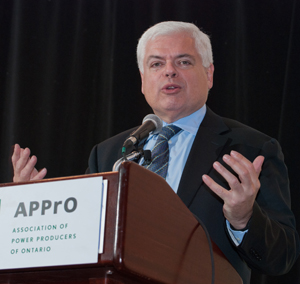
Will Stewart of Navigator Limited struck a more cautionary tone, warning that the election results are a negative sign for the energy industry, due to the clear regional divisions in the province between areas of Conservative and Liberal support. The sector is now more fraught with politics than ever, he said, Presenters at events like this one often return to the message that we need to get politics out of the sector. This is unrealistic, he said. Looking at the results geographically, we now have a divided province. Politically, none of the parties got the results they wanted, so they will all be looking for ways to gain more support. Mr Stewart opined that during the election, due to the political tension, politics too frequently trumped good public policy. This was evident for example in the cancellation of the Mississauga gas plant. This kind of short term political decision-making exacerbates uncertainty, which leads to additional price pressures on the industry.
Mr Stewart suggested that power producers should put an emphasis on building political capital, which, given the political climate, he believes is just as important as engineering and finance in bringing a project to completion. In order to be successful, campaigns directed to the grassroots will be just as important as campaigns directed to energy policy makers.

John Spears of the Toronto Star wrapped up the panel with three messages. First, he pointed out that the subject of renewables is one where there is considerable common ground between the NDP and Liberals. However, the parties are divided on whether the private or public sector should be building it. Mr Spears noted that it will be interesting to see whether the NDP will be able to affect the conversation in order to garner support for the public sector option. Secondly, Mr Spears questioned why the subject of nuclear refurbishment and new build was not raised during the election. He speculated that no party wants to raise the prospects of such expensive projects, and the Liberals may even try to delay the decision past the current minority government. Finally, he questioned why the electricity industry hasn’t done more to communicate with the public about its issues. Because electricity is such a complex subject, clear communication of the industry’s value to the ratepayer will be important.
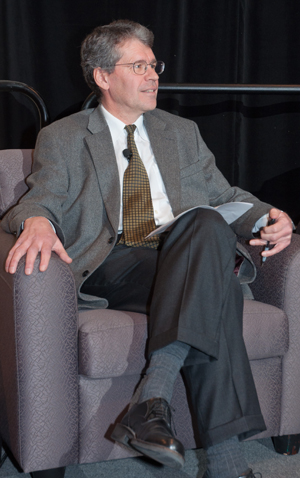
Moderator Sean Conway of Queens University relayed the first question from the floor to Rob Silver: What will government do with the inevitable nuclear cost overruns, especially working with a minority? After giving the government credit for the phase-out of coal, Rob Silver argued that SNC Lavalin has the balance sheets and the track record to deliver both refurbishment and new build. He noted that a deal will be needed that properly allocates risk among ratepayers, taxpayers, including taxpayers at the federal level, and shareholders.
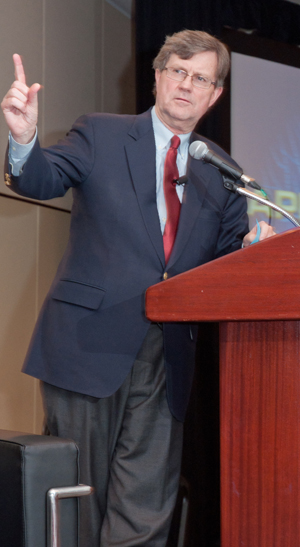
He also targeted NDP policy by saying that conservation alone will not keep the lights on, and that the NDP’s emphasis on across-the-board reductions in costs to consumers will not encourage conservation.
Peter Tabuns agreed that generation is needed in addition to conservation. But he said that in order to build an affordable system you have to start with the least-cost options first, those being efficiency and conservation. He knows people who would like to invest in home energy efficiency but can’t afford it. The provincial government has no home conservation program in place, something that would create jobs and reduce electricity bills. At the other end of the spectrum, the NDP considers new build at Darlington a mistake that would reduce the market for renewables. They believe that other options should be considered before refurbishment or new build.
Will Stewart agreed that something has to be done soon to replace the reactors that will come out of service in the near future. Solar and wind definitely have a role to play, but their intermittency means that something else has to be put in place for baseload.
Sean Conway then posed another question: How is it that the Portlands, Goreway, and Halton Hills power projects could be built, but more recently similar power plants in Mississauga and Oakville were stopped? What has changed? Further, with respect to the windfarms that have received such a negative reaction in some parts of rural Ontario, he recounted a conversation with a politician who was affected by the issue: He said it wasn’t the windfarms per se that irritated his constituents, but rather the fact that Mississauga and Oakville voters were able to defeat unwanted projects in their areas, while the rural voters could not defeat the windfarms.
Dave Butters observed that Goreway, etc. were begun early in the government’s term of office, while Oakville and Mississauga arose in a pre-election period. Governments can get a fair amount done in the early years, but later on politics will more often trump good policy.
John Spears added that the projects that were stopped were located in ridings held by the governing party.
David Coletto agreed on the urban-rural divide in the election, but said that it could be explained as largely a return to normal voting patterns – rural voters tend to go Conservative, urban go Liberal, while wedge issues can arise to accentuate the pattern.
Sean Conway posed a question to Rob Silver: Has politics has made good policy impossible in siting facilities? Rob Silver said no, pointing out that new generation in Sarnia got built, in a Liberal riding, likewise Goreway. It’s too simplistic to say that Portlands got stuck where it is because it’s an NDP riding. The ridings hosting the Bruce and Darlington nuclear plants are “begging for new build” there. So the operative factors are specific to each case, he argued, and the proponents in each case have to do their work building support.
A member of the audience pointed out that, contrary to some observations about transparency, the FIT program has very transparent pricing. Payments made to most other generators are not public information. He questioned whether the price of power would be very different if procured from publicly-owned versus privately-owned power, and from large versus small projects, and whether the province should move from a standard offer process to competitive procurement.
Peter Tabuns said that experience from Europe shows that community ownership greatly increases public acceptance of power projects. As to the cost of public versus private power, there is insufficient data to say, but he cited private energy traders making $200 million a year selling subsidized power across the border with the US. On efficiency and conservation, he cited a study showing energy consumption in Ontario could be economically reduced by 40%, with less reliance on nuclear power. (Of course, publicly-owned companies such as BC Hydro and Hydro Quebec also engage in power trading.)
Noting that the setting of FIT prices is not particularly transparent, John Spears said the terminology is also a problem in creating public acceptance – nobody knows what a “feed-in tariff” is. Perhaps a greater attempt could be made to educate the public, without “dumbing things down.”
Rob Silver addressed what he called the “canard” of the stealth privatization of the electricity sector. Ontario spent about $15.5 billion on electricity in the previous year, about $10 billion of which went through publicly-owned agencies and corporations. The revenue that flows through private sector players, including Bruce Power and the operators of many natural gas plants, is relatively small and there is no reason to believe the public sector could run them more cheaply. The proportion of OPG-owned power in the mix is decreasing, but the shutdown of the coal plants is a major factor in that. The resulting supply mix is entirely appropriate, he said.
Another question from the floor came in the form of a challenge to John Spears – is anyone looking into verifying the 50,000 jobs the government said would result from green energy?
Mr. Spears answered that the jobs figure gets inflated by the number of temporary construction jobs. Dave Butters concurred – the figure more properly should describe person-years of employment, rather than new permanent positions. Permanent jobs are also being created, but it’s not 50,000. Will Stewart commented that even some of the “permanent” jobs are more like corporate welfare. Peter Tabuns said that when the 50,000 number was announced there was no business plan to accompany it, despite several calls for one. More likely, he said, it was a rough estimate, though undoubtedly there would be a certain amount of job creation.
Ian Mondrow, a lawyer with Gowlings, noted that there are varying assessments as to how frequently politics will trump good public policy. It has never been entirely one way or the other he pointed out, and given that there is a lot of serious work to be done, he expressed the hope that, in most instances good policy would in fact influence decisions, rather than always being trumped by politics.
Will Stewart noted that, at this and previous conferences, the demand persistently arises to get politics out of the energy sector, but it’s a naïve expectation. Politics will always enter as an election approaches. “If you’re making multi-billion dollar decisions you’d better play the game, or you’re going to get steamrolled,” he said. John Spears commented that politics is about making decisions about public resources, something that is inherently political. David Coletto agreed that you can’t expect to take politics out of complicated issues. Politicians tend to simplify issues under the pressure of politics. Peter Tabuns said this is inevitable in a democracy, citing Winston Churchill’s observation that it’s the worst system, except for all the others.
Rob Silver, per contra, noted that politics hasn’t always trumped good policy. He cited as an example some of the decisions by Premier McGuinty in his first term of office when he lifted the price cap on electricity – this was good policy, but not good politics (i.e. it was not a popular move). Silver went on to say that government can facilitate getting social license from a community, while staying away from micromanaging the sector. There were numerous examples of putting distance between politics and policy prior to the Green Energy Act. For example, the establishment of an IPSP process with independent review, and the early attempts to give the OPA greater independence. The Minister would still have had huge input into policy but the electricity sector as a whole would have been much more like the natural gas sector in terms of the role played by government.
Dave Butters observed that most people in the world would be happy to live in a democracy like that in Ontario, imperfect as it may be. He put forward his belief that our elected politicians are basically well-intentioned, generally try to act for the common well-being, and want to find good public policy solutions. However, they face many challenges in the process and need to manage their way through a complex set of issues. The choices political leaders have to make are sometimes extremely difficult.
Sean Conway concluded by noting that vigorous debate is the sign of a healthy democracy, and thanked everyone for participating.
Conference reporter: Ian Chow. Edited for publication by Jake Brooks.
